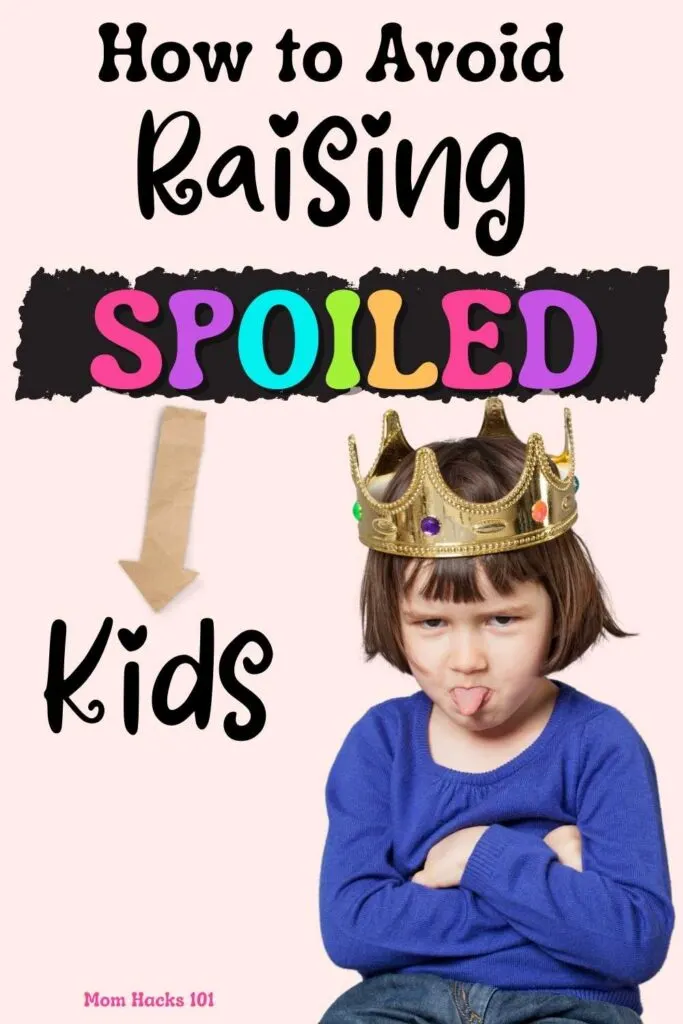Are you asking yourself “is my child spoiled?”
Here are 8 parenting hacks to avoid raising spoiled kids or even how to unspoil a child.

Spoiled Child Meaning
You might be wondering what being a spoiled kid means.
Of course, most people think it means a child that gets everything they want, but there is more to it than that.
It is not about having everything they want or getting whatever they wish for.
It is actually about children who are not taught how to function in the world on their own and are not given any responsibilities.
What causes spoiled kids?
The two most common causes of spoiled kids are parents who don’t know how to balance their parental authority with responsibility and parents who have low self-esteem.
If the parents, for example, have a difficult time saying no to their child, then that child will grow up expecting that he or she can have whatever he or she wants.
The problem with spoiling your kids is that you’re teaching them to be unprepared for adult life and to have no accountability.
When a spoiled child grows up, they are going to find out the hard way if they always think nothing is ever their fault.
They’ll spend years blaming others for their failures and self-entitlement will tear them apart.
Spoiled Child Syndrome
According to the American Academy of Pediatrics, spoiled child syndrome is characterized by excessive self-centered and immature behavior, resulting from the failure of parents to enforce consistent, age-appropriate limits.
As parents, we are the only ones who can prevent raising a spoiled child.
We must set boundaries and limits to prevent spoiling kids and to help raise them into well-rounded, responsible, and kind adults.

Ways To Avoid Raising Spoiled Kids
Teach Kids About Money
It’s never too early to teach the value of money to a child.
They need to know that everything in life has to be earned. That includes money and respect.
It is easy to want to spoil your child if you grew up without money.
However, that is exactly why you shouldn’t spoil your child.
I have heard so many parents say “I want to give my kids all the things I didn’t have growing up.”
That well-intended statement is very understood on so many levels, but when it comes to material things, we must never overindulge our kids.
Children need to know that nothing in life is free.
They need to know that, as their parents, we work hard to provide them with basic needs like a home, food, and clothing.
That’s not to mention all the extras like vacations, extracurricular activities, toys, etc.
Kids need to be aware that money isn’t free, and that everything costs money.
Remember, what we teach them now will greatly affect their future.
As adults, they will HAVE to work and keep a budget, just like we do.
So give your kids a piggy bank to start saving their “own” money from birthdays, chores, or even allowances.
Teaching them the value of saving up for something they want is an important lesson that they will always need to know.
It also tackles the “instant gratification” problem that most spoiled kids have.
Teach Kids Responsibility
There are many ways to teach kids responsibility.
You can start at a young age by giving them daily responsibilities and chores like picking up their toys and setting the table for dinner.
My kids use a chore chart to keep them on track and it helps to keep our house tidy, so it’s a win-win for me.
You can print out free chore charts from my FREE Resource Library.
Also, taking care of pets is another great way to teach kids responsibility.
When children take on the responsibility of taking care of a pet, it gives them the opportunity to take care of another living thing and in return, they get unconditional love and companionship.
It is important for parents to be patient with their children when teaching them about responsibility.
It is an important life lesson that cannot be taught overnight but needs time and patience for it to sink in.
Teach Kids Empathy
With the rise of social media, it is becoming increasingly important to teach kids empathy.
We need to teach kids how to be compassionate people who are aware of how their actions impact others.
When we are teaching empathy to kids, it is important to show them how to use it in their day-to-day lives.
Kids are born with a natural empathy for others, but it can be nurtured in a few extra ways.
One way to teach empathy is through storytelling.
Stories have the power to show us the perspectives of different people and make us more understanding of their feelings.
Another way to teach kids kindness and empathy is through connecting.
When kids connect with someone who’s in need, they get a sense of how it feels to be on the other end of compassion and care.
Also, they see how much being kind to others can make them feel good about themselves.
One way for kids to practice empathy and kindness is to participate in a 30-Day Kindness Challenge.
You can get a FREE kindness calendar for kids to print off so they can keep track of all of their acts of kindness to others.
The benefits of doing random acts of kindness are better social skills, improved mental health, higher self-esteem, and more.
Be A Role Model
Children aren’t born spoiled and entitled, they learn it from the people they are around the most.
It is so important for parents, as well as educators, to be careful about what they say and do in front of children.
Kids model behavior from the adults around them.
As parents, we have to stay consciously aware that our children are always watching us.
They emulate our actions, our words, our attitudes, and even our feelings.
In a lot of cases, kids learn by observing and imitating what their parents do.
We need to be mindful of this when we think about how we want our kids to grow up as adults.
We must be the best role models we can be for our kids!
Remember, parents, are their children’s first teacher.
The role of parents is to teach their children about the world and how to navigate it.
It is up to us to show our kids how to think critically, behave well, and be kind to others as well as themselves.
Teach Kids Respect
Respectful kids are considerate to others. They are empathetic and show kindness to those around them.
When kids learn respect they listen to other people and they have a strong sense of justice.
They care about the feelings of other people even when it’s not convenient for them.
Teaching spoiled kids to be respectful and polite may be a tough challenge but it can be done.
You must use a positive, effective, and consistent approach to teaching children about respect.
Below are some tips for parents on how they can teach their children the basics of good manners at home, in school, and out in the real world.
Parents can teach kids to show respect by following these steps:
-Talk about the concepts of respect and what it means to show someone respect.
-Model respectful behaviors and language.
-Help children understand their own feelings and emotions as they relate to respectful or disrespectful behavior.
Practice Gratitude
Gratitude is the emotion that comes from giving thanks.
It is a powerful emotion because it can motivate action and energize people.
Gratitude has a wide range of positive effects on physical and mental health, happiness, relationships, and much more.
One way to teach kids gratitude is to ask them to name 3 things that they are thankful for each day.
Another way is to have your child keep a gratitude journal to give help them list daily reminders of what they are grateful for.
Check out these happy journals for kids, there is a Rainbow Edition and a Dino Edition.
They are great for helping kids stay focused on the good in their life!
Set Rules and Limits
Setting limits and rules for kids is important because it helps them develop responsibility and gives them a sense of structure.
Kids need to feel safe at home so they can be confident and happy in the outside world.
Kids are just like sponges. They need boundaries and limits set.
For example, as parents, we can’t allow TV and screentime to take control of our child’s free time.
Instead, make sure that your child is engaged in productive screen-free activities such as reading, doing art, or playing with toys.
Also, it is important to set rules for the kids in order to avoid arguments and power struggles.
It will help them learn about their boundaries and limits as well as develop self-regulation skills.
Stop Giving In
For the most part, children are always trying to get their way.
Sometimes we give in because it’s just easier.
It is OK to give in sometimes, we just have to make sure we don’t get in a habit of always caving to our children’s demands.
When parents give in to a child all the time it can cause problems in the future.
First off, it will send the message to kids that they are not capable of taking care of themselves.
Also, it teaches them that they don’t have to try hard for things.
As adults, we want them to have a good work ethic and not be lazy.
So stop giving in, because it shapes how children develop into adulthood.
How To UnSpoil A Child
Sometimes it’s a harsh reality check when you realize that you have unintentionally raised a spoiled child.
Once you realize where you have gone wrong then it’s time to take active steps to change the behavior and unspoil your child.
Admitting that you need to change some parenting skills doesn’t mean you have failed as a parent, it means that you are a good parent because you are actively trying to raise your child to be a good person, even if it means undoing what you have done.
It’s no secret that parents have a huge responsibility on their hands. They are shaping and molding the future!
That is why it is so important to not spoil kids.
It is easy for kids to get spoiled, but using the tips above can really help if you are searching for how to unspoil a child.
Just remember, parenting is not an easy job but it is the most IMPORTANT job.
Parents should be mindful of the behaviors that they are modeling for their children and make sure that they are not doing anything that could have a negative effect on their development.
For more parenting hacks be sure to sign up for the Mom Hacks 101 Monthly Newsletter & get access to the FREE Resource Library!
